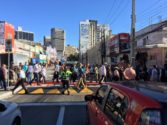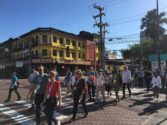
225 experts from 48 cities in 21 countries attended MOBILIZE Fortaleza
Fortaleza (June 24, 2019) – Fortaleza, a coastal city of 2.6 million in the state of Ceará, has achieved something that cities around the world envy: a massive drop in road fatalities. That alone is an achievement, but what makes it even more impressive, is that the drop happened in three years, and it was all done with relatively simple, low-cost interventions. Over the next three days, transport and urban development experts from all over the word are here to find out how the city did it, and how this success can be replicated in other cities.

Fortaleza has been making rapid progress in improving their streets and transport systems since 2014, spurred by an increase in road safety and accessibility concerns. Deaths from traffic collisions at a rate of 15 per 100,000 put them squarely in the average rate for cities in the Americas, continuing with the car-oriented path of their neighbors. Many other cities responded by giving more of their city’s space to cars, at the expense of pedestrians, cyclists, and public transit users; but Fortaleza did something different.

Fortaleza created “complete streets”, with more equal space dedicated to all road users, rather than making streets only for cars. They built new right-of-way for their buses, adding 111 kilometers of bus-only lanes, with refurbished bus terminals, and a fare-integrated system with the light rail, making the bus experience faster, safer, and more comfortable. These interventions increased the average bus speed from 4 km/h to 14 km/h, and is saving nine tons of C02 per day. All city buses have Wi-Fi, and an increasing number have air conditioning.
The city also took care to support people who travel in different ways, delivering a whopping 225 kilometers of bike lanes and other cycling infrastructure, with 170 of those added since 2013, making it easier to integrate cycling with the bus and light rail. The city has four bike share systems, with the most popular, Bicicletar, has six trips per day per bike. This puts them at the level of popularity of New York’s Citibike, considered a best practice in daily use. It worked. Annual bike counts conducted by the city showed a 150 percent increase of bikes on the street from 2013 to 2017. It is also significant that bike share rides, tracked by Bicicletar, showed that 42 percent of users are women, and 40 percent are between 40 and 60 years old, showing that these groups feel safe riding on the street.
Other interventions, such as a reduced speed limit in certain areas, and improved street design, which includes making traffic lanes narrower, and raising crosswalks to make them more visible, have also contributed. And there is the value of public space, an essential part of any people-centered city, which Fortaleza has embraced. Temporary interventions, such as Cidade da Gente, which transformed a parking lot and traffic lanes into a pedestrian area, showed what is possible.
In 2016, the city’s annual monitoring of traffic collisions revealed the lowest number of deaths in 15 years. Then, they went even lower, with 9 per 100,000 in 2017. Fortaleza was selected to host MOBILIZE by the Sustainable Transport Award Committee, who named it as the 2019 Sustainable Transport Award winner. Fortaleza accepted the award at a ceremony in Washington, DC, in January 2019.
MOBILIZE is the 4th annual Sustainable Transport Summit of the Institute for Transportation and Development Policy (ITDP), in partnership with the Volvo Research and Education Foundations. The event will showcase best practices and lessons in sustainable mobility to an international group of city practitioners and researchers, spotlighting this emerging city as a learning lab, with the theme of “Reclaiming Streets for Access and Mobility. Previous MOBILIZE summits have been hosted by Dar es Salaam, Tanzania; Santiago, Chile; and Yichang, China.
“Cities around the world are grappling with growth and congestion, and Fortaleza demonstrates the value of prioritizing transit and space for people,” Says Heather Thompson, ITDP CEO, “We’re particularly excited about the replicability of what’s been achieved in Fortaleza in a relatively short time, and a comparatively minor investment by the city. This is exactly the type of results-oriented, on-the-ground approach that we want to encourage, and we’re thrilled to convene experts from all over the world to see it first-hand.”
For more information on MOBILIZE, including agenda, speakers, and site visits, visit mobilizesummit.org.


